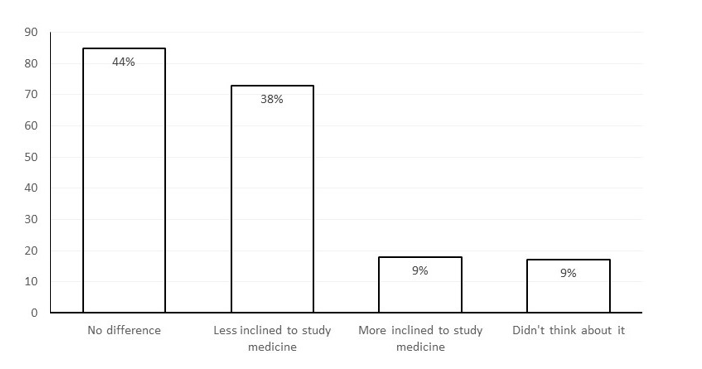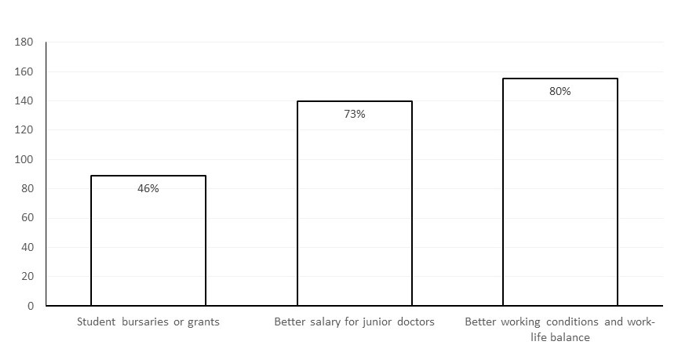Review Article / Open Access
DOI: 10.31488/HEPH.192
Effect of doctors’ strike on prospective medical students in the UK
Sarah Jannat Iqbal
1. Luqman Academy, Sheffield, UK
*Corresponding author:Sarah Jannat Iqbal, Luqman Academy, Tinsley Park Road, Sheffield, S9 5DL, UK
Abstract
Objective: Doctors in the UK have been striking recently. This survey aimed to explore the effects of doctors’ strikes on prospective medical students in the UK. Methods: This study is a prospective online survey of the students in GCSE, A-level or degree courses in the UK aiming to join a medical school to study medicine. Results: A total of 193 UK students participated. 65% of respondents were A-level students, 21% were in GCSE and 14% were aiming for graduate entry into the medical profession. Majority of the participants believed that the main reasons for doctors’ strike were poor working conditions in the NHS (41%) and inflation or cost of living crisis (40%). A sizable proportion of prospective medical students (38%) were less inclined to join the medical profession having seen doctors strikes. Half of the respondents said that they may consider leaving the UK after becoming a doctor. This was due to perceived better work-life balance (39%) or better salary (34%) elsewhere. Majority (55%) believed the general public was supportive of doctors’ strike action but 29% thought the public was against doctors’ strike and 16% were unsure. Respondents appreciated that these strikes may increase doctors’ salary and NHS funding, but they also feared that strikes may cause potential patient harm or fail to achieve their objective resulting in more doctors leaving the UK. Majority of the prospective medical students (78%) themselves were supportive of doctors-striking. If doctors’ strikes fail to achieve their objectives, 65% of prospective students said that they will still study medicine but may leave the NHS or the UK if necessary. Conclusion: Doctor’s strike has significant impact on prospective medical students and it may influence the future of medical workforce in UK.
Key words: Medical students, strike, work-life balance, salary
Introduction
Junior doctors as well consultants in the National Health Services (NHS) in the UK have been taking industrial action and striking on and off for several months. Although, UK government and doctors’ associations have been presenting different views about these strikes, previous data suggest that strikes have an impact on patient care [1]. Undoubtedly, current strikes have also resulted in cancellation of elective appointments and treatments whilst doctors have been striving to ensure provision of emergency services during these strikes. Medical, financial, moral and various other aspects of these strikes have been studied and discussed [2-4]. However, the effect of these strikes on prospective medical students who are likely to be the future workforce of the medical profession has not been assessed. These strikes may create concerns, uncertainty and ethical conflicts in the mind of young students aspiring to study medicine. This survey aimed to explore the effects of doctors’ strike on prospective medical students in the UK.
Methods
This prospective study was conducted online using Google Forms. Data were collected through a short questionnaire designed for this purpose on google forms. The questionnaire consisted of 11 questions consisting of check and tick-box questions for encouragement to fill it along with a free-text answer at the end to allow students to share their own views if not already encompassed by previous questions. This survey can be seen at: https://forms.gle/2ePLxMgvRPE3KUfB7
Participants
Information about the survey along with the survey link was sent to multiple schools to reach the target audience. Participants were also encouraged to share the survey link with other relevant students. At the beginning of the questionnaire a qualifying question asked the participants to confirm that they were a GCSE, A-level or University student in the UK aiming for entry into Medicine and that they consented to participate in the survey.
Data management and analysis
Data were automatically analysed in the google forms. Microsoft Excel was used for further analyses and to generate graphs.
Results
A total of 193 prospective medical students completed the online survey. Two-third (65%) respondents were A-level students, 21% were in GCSE and 14% aiming for graduate entry into the medical profession.
Participants believed that the main reason for the doctor’s strike was poor working conditions in the NHS (41%) or inflation and cost of living crisis (40%). Majority (55%) were of the opinion that the general public is supportive of doctors’ strike action but 29% thought the public is against doctors’ strike and 16% were unsure. Participants were enquired whether they would have taken part in the strike if they were doctors today. 78% students responded said that they would have taken part in the strike, but ensuring that emergency services are covered, if they were a qualified doctor today and only 9% would have not participated in strike whilst 13% were unsure. Respondents hoped that these strikes may increase doctors’ salary (80%) and NHS funding (62%) but they also feared that strikes may fail resulting in more doctors leaving the UK (67%) and patient harm (65%) or loss of respect for the medical profession (44%). When asked about what they think should happen to end strikes, 68% stated that the government and doctors should have a dialogue to find an acceptable solution and 29% thought the Govt. should accept doctors’ demands.
A sizable proportion of prospective medical students (38%) were less inclined to join the medical profession after seeing doctors striking, although for 44% students it did not have any impact on decision to go into the medical profession and 9% were more inclined to join the medical profession in the aftermath of strikes (Figure 1).

Figure 1:Effect of doctors’ strike on prospective medical students’ decision to study medicine
When told that a recent survey has suggested 30% of medical students were considering to leave the UK after becoming a doctor and/or leave the medical profession altogether [5], 50% of prospective students said they may also be willing to leave the UK after becoming a doctor and 18% said it makes them less inclined to study medicine. For 32% students, it did not make any difference to their decision to study medicine. When asked about the possible reason for 30% current medical students to think about leaving medicine and/or the UK, prospective medical students viewed it to be due to better work-life balance elsewhere (39%), better salary elsewhere (34%) or poor working conditions in the NHS (19%). 65% prospective students said that they will still study medicine but keep the option to leave the NHS or the UK. Prospective medical students thought that improving working conditions in the NHS, improving work-life balance, better salaries after graduating as a doctor and bursaries or grants for medical students to cover university costs can make the medical profession more attractive (Figure 2).

Figure 2:What can be done to make medical profession more attractive for students?
Discussion
To the best of author’s knowledge, this is the first study to evaluate the impact of doctors’ strike on prospective medical students in the UK. The study highlighted that prospective medical students are carefully evaluating the possible causes and potential outcomes of these strikes and it may affect their decision to study medicine. This in-turn may have an impact on the future of the medical workforce in the UK [6]. Policy makers should carefully evaluate these data and take appropriate actions to ensure that studying medicine remains an attractive option for students in the UK.
Strike of medical professionals has always remained controversial [7,8]. To be able to strike is considered a fundamental right of employees under Article 11 of the European Convention of Human Rights. On the other hand, strike may be considered against the Hippocratic oath which emphasises that patient interest should remain uncompromised. Our data suggest that the majority of prospective students were in favour of doctors’ strike, and they also believed that the general public is also supportive of doctors’ view. This has been demonstrated in other studies as well [9]. Students were rightly concerned about provision of emergency care and most were of the view that they will only strike if emergency care provision is not affected. Previous studies have not shown any effect of strikes on mortality but less serious effects cannot be excluded [3,4].
Medicine is generally considered to be a well-paid job. So, it may come as a surprise that doctors need to strike. However, students leave medical school with considerable debt and the salary of junior doctors has been eroded by rising inflation [10]. Work-life balance has been considered as a significant factor amongst doctors in deciding their speciality [11] and our results suggest that it may also play a role in decision making of prospective students to study medicine or not. Prospective students were therefore keen to see bursaries and grants for medical students along with better salary and working conditions after graduating as a doctor.
This survey has its limitations. It was posted on social groups and emailed to secondary schools and sixth form colleges but it only required self-declaration to participate. Although this survey has a fair sample size, it represents only a small proportion of students in the UK and a selection bias cannot be excluded.
Conflict of Interests
None declared
Funding
None
Acknowledgement
Prof Syed Anwar Hussain, University of Sheffield, for his help in this study.
References
1. Ruiz M, Bottle A, Aylin P. A retrospective study of the impact of the doctors' strike in England on 21 June 2012. J R Soc Med. 2013;106(10):362–9.
2. Stoye G, Warner M. The effects of doctor strikes on patient outcomes: Evidence from the English NHS. J Econ Behav Organ. 2023;212:689–707.
3. Essex R, Milligan W, Williams G. The impact of strike action on patient morbidity: A systematic literature review. Int J Health Plann Manage. 2022;37(3):1311–26.
4. Ravioli S, Jina R, Risk O. Impact of junior doctor strikes on patient flow in the emergency department: a cross-sectional analysis. Eur J Emerg Med. 2024;31(1):53–8.
5. Ferreira T, Collins AM, Feng O.Career intentions of medical students in the UK: a national, cross-sectional study (AIMS study). BMJ Open. 2023;13(10):e075598.
6. Armitage R. Junior doctors leaving the NHS: what would it mean for general practice? Br J Gen Pract. 2023;73(727):126–7.
7. Toynbee M, Al-Diwani AA, Clacey J. Should junior doctors strike? J Med Ethics. 2016;42(3):167–70.
8. Chima SC. Global medicine: Is it ethical or morally justifiable for doctors and other healthcare workers to go on strike? BMC Med Ethics. 2013;14(Suppl 1):S5.
9. Essex R, Burns C, Evans TR. A last resort? A scoping review of patient and healthcare worker attitudes toward strike action. Nurs Inq. 2023;30(4):e12535.
10. Medisauskaite A, Viney R, Rich A. Financial difficulty in the medical profession. J R Soc Med. 2023;116(4):160–6.
11. Goldacre MJ, Goldacre R, Lambert TW. Doctors who considered but did not pursue specific clinical specialties as careers: questionnaire surveys. J R Soc Med. 2012;105(4):166–76.
Received: January 11, 2025;
Accepted: February 06, 2025;
Published:February 11, 2025 .
To cite this article : Iqbal SJ. Effect of doctors’ strike on prospective medical students in the UK. Health Education and Public Health. 2025; 8(1): 584-588. doi: 10.31488/HEPH.192.
© The Author(s) 2025.
